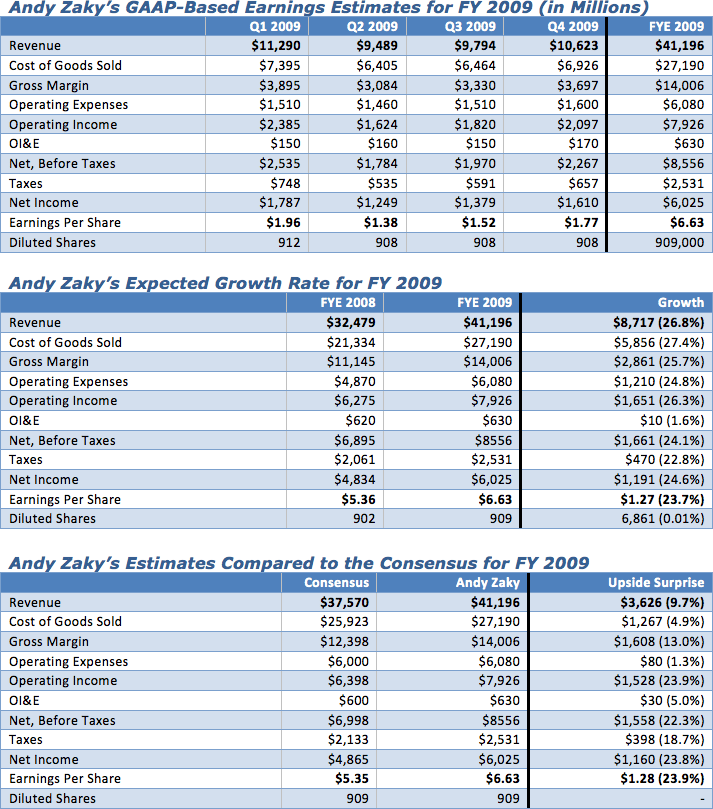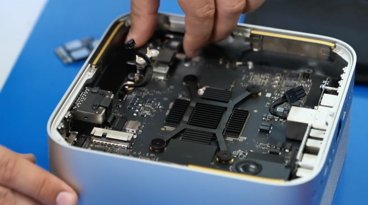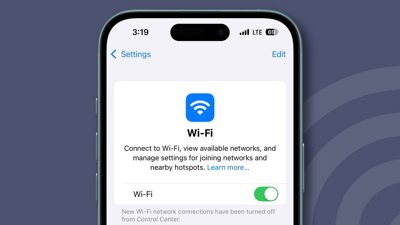As of today, the analysts are now looking for Apple to earn $5.35 in EPS on approximately $37.5 billion in revenue in 2009. The consensus has Apple literally contracting on the year — down from $5.36 in EPS in 2008. These extraordinarily bearish consensus estimates have set Apple up to beat revenue expectations by approximately $900 million each quarter in 2009.
I expect Apple to earn about $6.63 in EPS on $41.2 billion in revenue beating expectations by $1.28 in EPS and $3.63 billion in revenue. This amounts to an average quarterly beat of $907 million in revenue and $0.32 in EPS. Even before this recent bout of downward revisions to the estimate, I saw the consensus as already pricing in a moderate to severe recession.
The biggest problem with the current consensus estimate is that it either contemplates flat growth in unit sales across all of Apple’s product lines (including Macs and iPhones), or it fails to realize that Apple has a massive current deferred revenue pot that it will fully recognize in 2009. Sitting in a small corner of Apple’s financial statement, current deferred revenue is something that can easily be overlooked by analysts who either don’t fully analyze the company, or don’t normally cover the company.
Due to the subscription method of accounting for iPhone and Apple TV sales, Apple recognizes the revenue it receives from the devices over a 730-day period (rather than at the point of sale). At the end of every accounting period, Apple reports its total current and non-current deferred revenue for the iPhone and Apple TV on its consolidated schedule of deferred revenue.
Current deferred revenue is revenue that Apple will recognize over a 365-day period from the date of the financial statement, while non-current deferred revenue is revenue that Apple will begin to recognize starting 365 days after the date on the financial statement.
Thus, at the end of Apple’s fiscal fourth quarter, current deferred revenue is literally revenue that Apple will recognize in the ensuing fiscal year. At the end of 2007, for example, Apple had $346 million in current deferred revenue which it got to recognize equally over the 365 days of fiscal 2008. That averages to about $86.5 million that Apple was able to recognize for each quarter of 2008 without having to sell a single item in the period. Now compare that number to 2009.
Current deferred revenue at the close of Apple fiscal Q4 2008 was $3.518 billion—over 10 times the amount going into fiscal 08. This means that if Apple didn’t sell a single product in 2009, it would automatically get to recognize $880 million per quarter (compared to the $86.5 million that Apple got to recognize each quarter in 2008). Now here’s where things get complicated, and where the flaw in the analyst consensus is revealed. It’s important to follow this point very closely.
Since Apple went into 2008 with a revenue benefit of $346 million, while going into 2009 with revenue benefit of $3.518 billion, one must back out these benefits to get an idea of what the consensus is really indicating about Apple’s business in 2009. By backing out these benefits, one gets a clearer picture of how Apple actually performed in 2008 (without regard to benefits from sales in 2007) and how the analysts think Apple will actually perform in 2009 (without regard to benefits received from sales in 2008). By doing this, one will be able to determine the actual growth rate estimates in unit sales and revenue by the analysts. It basically answers the question of what will 2009 sales contribute in total revenue minus deferred revenue benefits.
Here’s the basic math. If one subtracts the $346 million benefit Apple received in 2008, Apple would have reported $32.133 billion in revenue ($32.478 billion - $.346 billion). If one subtracts the $3.518 billion revenue benefit that Apple will recognize in 2009 from the analyst consensus estimate of $37.57 billion in revenue, he or she would arrive at a $34.052 billion figure. What this tells us is that the analysts believe that Apple will grow its revenue by only $1.919 billion in 2009 when backing out the current deferred revenue benefit.
That’s a mere 5.9% growth rate in revenue despite the fact that Apple’s Mac sales are growing at over 3 times the industry average, and despite the fact that iPhone unit sales grew over 400% in Q4 alone. Even iPod sales are still growing at nearly 5-8% per period and iTunes continues to grow at over 30% on a YoY basis each quarter. Also, it’s important to note that any time Apple sells over 5 million iPhone within any given quarter, Apple not only gets to recognize $400 million in revenue in that particular period, but it gets to recognize roughly $400 million in revenue each quarter for 7 quarters thereafter. This literally means that iPhone sales in Q1 alone could add about $1.6 billion in revenue for the year, which would make up almost all of the $1.919 billion in sales growth that the analysts are expecting for 09.
This fact single-handedly suggests that the consensus is plainly factoring in negative revenue growth for all of Apple’s products in 2009 save the iPhone. Because even if Apple sells only 2.5 million iPhones in Q2 after selling 5 million Q1, Apple would have already surpassed analyst revenue growth estimates for 2009—even if sales are exactly flat across all of its other product lines. Basic common sense would suggest that such estimates are entirely irrational. While a moderate to deep recession will undoubtedly affect Apple’s business, the natural growth rate and penetration in even a flat economic environment should offset the negative effects of a slowdown.
Disclosure: Andy owns long term 2009 and 2010 call options in Apple. The information contained in this post is not to be taken as either an investment or trading recommendation, and serious traders or investors should consult with their own professional financial advisors before acting on any thoughts expressed in this publication.
 Andy M. Zaky, Bullish Cross, Special to AppleInsider
Andy M. Zaky, Bullish Cross, Special to AppleInsider














 Oliver Haslam
Oliver Haslam
 William Gallagher
William Gallagher
 Christine McKee
Christine McKee
 Sponsored Content
Sponsored Content

 Malcolm Owen
Malcolm Owen
 Andrew Orr
Andrew Orr









10 Comments
That is an incredible feat in this economy, grats to Apple_____________

And this report will do what for Apple's share price? Give it a $5 pop for one day after earnings?
While I agree with the basic premise, there are a few problems:
1. First and formost, using 4Q iPhone sales to predict future sales is as big a flaw in logic as other analysts not taking into account Apple's deferred revenue. Is that quoted 400% increase in unit sales a year-over-year number, or 3Q to 4Q number? Remember that Apple all but stopped selling the 1st gen iPhone for the last month of 3Q. They had run out of iPhone while they ramped up production of the new version. The new iPhone and low supply led to a huge pent up demand in the 4th quarter.
2. A second mistake is tying EPS entirely to revenue growth and ignoring expenses as if they have no effect. Lower EPS could be due to lower revenue as the article states, or higher expenses. Apple has stated that it's margins were going to be lower due to product transitions. The MB/MBP have transitioned to the new manufacturig process. There could be other transitions coming. Lower margins and selling at the same or higher prices (in the case of the MB) means higher expenses. It's may be a small effect, but the point is that EPS to revenue is not a 1-to-1 relationship.
Don't get me wrong, I agree that the analysts are selling Apple short (no pun intended). But the only thing worse than an Apple technology fanboy is a financial fanboy who owns long-term call options on Apple.
Do you see it I have seen that every time someone said some good about apple the stock prices go down...
So lets stop saying good things about and then the stock prices will go up to where they really belong.
Andy, I think your Q1 numbers are unrealistic from a purely casual observation standpoint. Q1 doesn't have Q4's pent-up demand for the 3G iPhone; much more than 4MM units would surprise me. The pent-up demand for the laptops could help grow from 1.68MM units to closer to 2.5MM, although desktops should stay flat around 1MM. iPods would surprise me if they were a significant growth driver, but it is possible they would sell 13MM units.
Realistically, Q1 EPS will not be better than last year. The remainder of the year I am much more optimistic though.